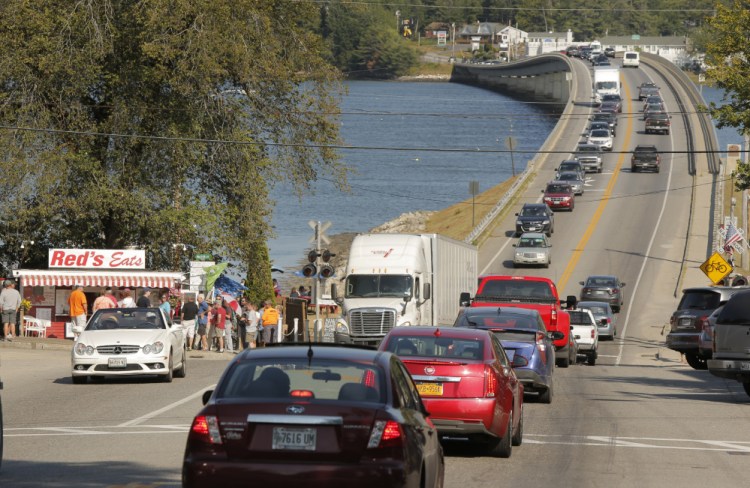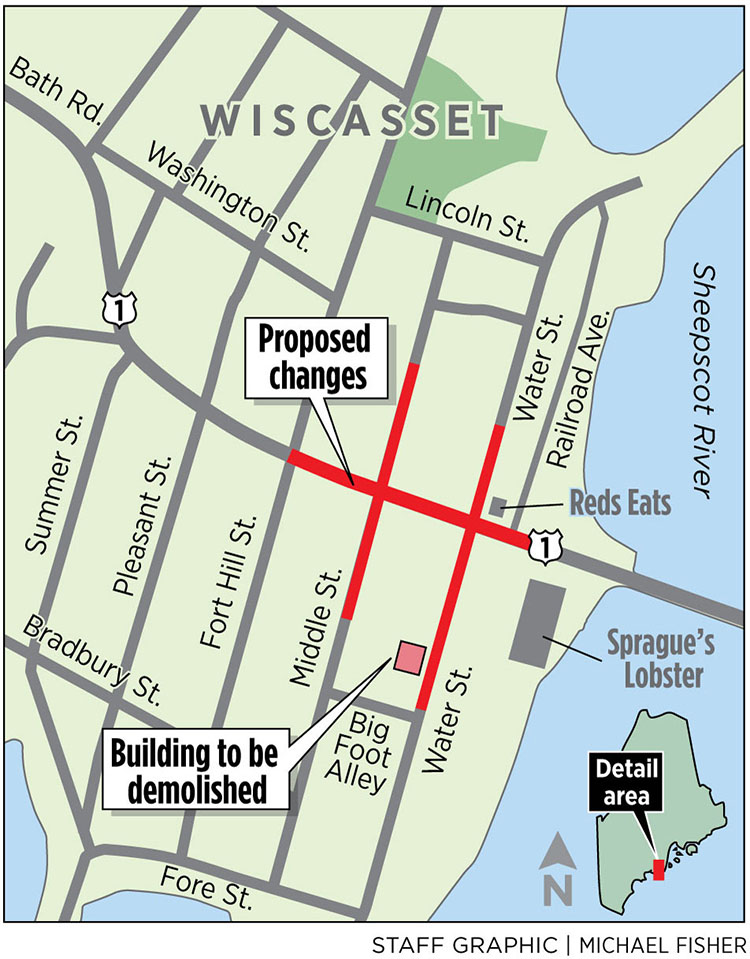The owner of several properties affected by Wiscasset’s dispute with the state over a controversial traffic project in the village center has offered to cover the town’s legal bills in the matter.
Ralph H. Doering III, whose family owns several 19th-century commercial buildings on and near Main Street in the historic village center, made the offer in a Jan. 24 letter to selectmen that was made public Tuesday night.
Doering said the offer was prompted by concerns that the town would give up or severely compromise its fight against the Maine Department of Transportation because of the mounting costs faced by the cash-strapped midcoast community of 3,700.
“The selectmen clearly want to defend Wiscasset and its laws and ordinances, but MDOT was going to make it financially difficult to do it,” Doering told the Portland Press Herald on Wednesday from his home in Florida. “We don’t know if they will accept the offer. But we want the town to be able to defend itself without having financial considerations.”
Wiscasset filed suit Nov. 28 to compel the state to abide by local ordinances and commitments made in an earlier agreement that had won the endorsement of residents in a local referendum. A lawyer for the town, John Shumadine, confirmed that Wiscasset is in negotiations with the department on the issue and said they “are making progress,” but he could not go into detail.
Doering, whose company has its own suit against the MDOT pending before an appeals court, said he was concerned that the negotiations were being prompted by worries over legal costs. In November, selectmen voted “to accept donations of money to the town” to supplement its appropriations to support legal action in the case.

This rendering shows some changes proposed for downtown Wiscasset that include installing new traffic lights and turn-out lanes at intersections. The Maine Department of Transportation planned to move forward with the plan despite withdrawal of support by the town selectboard.
It is not clear whether the town will accept Doering’s offer, and Town Manager Marian Anderson did not respond to an interview request.
Wiscasset’s village center – a largely intact complex of 18th- and 19th-century buildings that was named to the National Register of Historic Places in 1973 – is the site of notorious summer traffic jams 2 to 3 miles long on Route 1 on the north and south approaches to the Sheepscot River bridge. The state has been trying to solve the problem for more than half a century.
The state’s latest plan – a $5 million state-funded project unveiled in the spring of 2016 that promises to improve traffic flow during the worst traffic jams by 12 percent to 14 percent – would make most of its gains by adding two traffic lights and “bump out” pedestrian crossing waiting areas in the village. The controversial part is the elimination of on-street parking on Main Street and parts of key side streets – measures that the state’s studies say account for just 2 percent to 4 percent of flow improvement.
Residents and the select board initially supported the plan nonetheless, but majorities of both now oppose it because they say the state has not upheld its end of the bargain and has broken key promises. In June 2017, residents revoked their support in a town referendum after the state reneged on commitments to use federal funding and thus abide by the associated historic preservation and environmental reviews and requirements that come with it, and to not take any properties by eminent domain.
The town’s suit was prompted by the state’s imminent plan to demolish the 1916 Haggett Garage property, which it had purchased by invoking eminent domain in order to create off-street replacement parking. The MDOT has since agreed not to demolish the building until after the legal challenge is resolved.
Most local merchants and commercial property owners fear the loss of on-street parking will hurt businesses, although a minority argue it will improve the town by bringing more foot traffic to side streets (where new parking lots will be located) and repairing sidewalks.
“The MDOT seems hell-bent on this plan that is not going to work, and they are obviously under some kind of orders or directive from the governor to do something about the traffic problem,” Doering said.
Last year, Gov. Paul LePage responded to several constituent letters on the issue in forceful terms, describing the town as obstructionist.
“I have given MDOT full authority to fix this nightmare with or without working with Wiscasset,” LePage wrote to a constituent in August. “After 65 years of trying to work with Wiscasset, the time has come to move on.”
In another message, LePage, who often commutes to his Boothbay home from Augusta via Wiscasset, indicated he was fed up.
“Between June and September it takes approximately (give or take a few minutes) 1 hour 20 minutes to go from Augusta to Boothbay. The rest of the year it takes 40 minutes,” he wrote. “If it were up to me – I would do what was done in Bath. I’d put a bridge from the post office to the middle of the bridge and bypass downtown. U.S. 1 is a state responsibility and not the town.”
MDOT spokesman Ted Talbot declined to comment on the latest developments in Wiscasset, citing the pending litigation.
Colin Woodard can be contacted at:
cwoodard@pressherald.com
Send questions/comments to the editors.





Comments are no longer available on this story